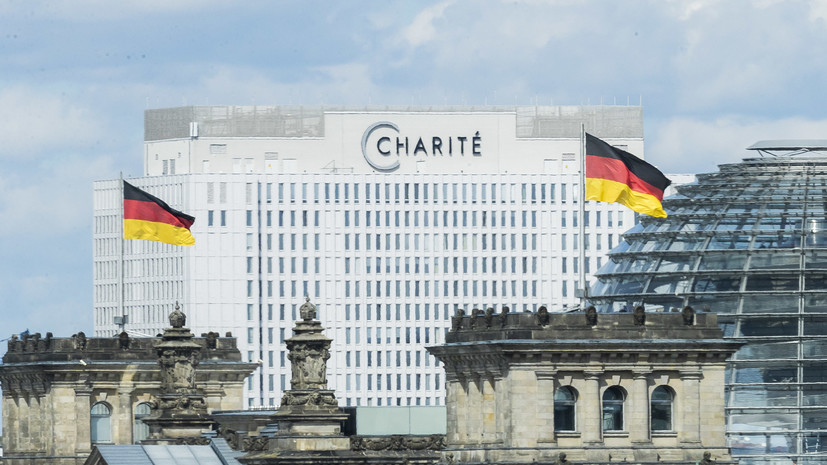The German authorities must be aware that they will have to face responsibility for the situation with Alexei Navalny and "the campaign of libel unleashed by Berlin at his submission."
This was stated by the First Deputy Permanent Representative of Russia to the UN Dmitry Polyansky during a meeting in the UN Security Council, addressing the Permanent Representative of the Federal Republic of Germany Christoph Heusgen.
Note that the topic of the meeting was the Joint Comprehensive Plan of Action on the Iranian nuclear program.
At the same time, the German diplomat raised the topic of the incident with Alexei Navalny, advising his Russian colleague to read an article in Der Spiegel.
“I would like to remind our German colleagues that not only our numerous specific questions to the German side, but also five official requests of the Russian Prosecutor General's Office for legal assistance remain unanswered.
Without this, it is simply ridiculous to say that the German side is taking this story seriously.
Please do not forget about this when you play along with the new phantasmagoric revelations of Mr. Navalny.
Sooner or later, we will have to answer for all this campaign of slander unleashed by Berlin at its filing, ”Polyansky said.
Commenting on Heusgen's speech, Polyansky also noted that the German Permanent Representative "developed a kind of dependence - not a meeting without criticizing Russia, even if the topic of the event is not suitable for this."
The Russian expressed the hope that "this unhealthy symptom" of his German colleague will pass after January 1 (from 2021, Germany ceases to be a non-permanent member of the Security Council. -
RT
).
Commenting on the recommendation to read the article in Der Spiegel, Polyansky indicated that Russia prefers to trust the facts, while some Western media rely on "sources long known as a kind of journalistic branch of the Western intelligence services."
“We only trust facts that are beyond doubt.
In this case, the degree of absurdity of the journalistic statements you mentioned simply goes off scale.
It’s even somehow inconvenient that you, Christophe, a politician and diplomat with a reputation for being a serious, albeit very emotional person, are promoting such low-grade and unprofessional nonsense.
Apparently, the long-term intensive reading of The New York Times has its effect.
Not every mind can withstand such a load of fake news, ”stressed Russia's first deputy permanent representative to the UN.
At the end of his speech, Polyansky said goodbye to Heusgen, using the aphorism of the Russian satirist Mikhail Zhvanetsky, who died on November 6.
“What a pity that you finally leave,” he said, wishing the German diplomat good luck.
"We'll have to answer": the Russian diplomat reminded the FRG of the consequences due to the situation with Navalny
In addition, the Deputy Permanent Representative of China to the UN Geng Shuang accused Christoph Heusgen of "malicious attacks" against other members of the Security Council and "poisoning the working atmosphere."
“What he said has absolutely nothing to do with the topic of today's meeting, does not correspond to reality and clearly runs counter to the spirit of cooperation and unity,” Geng said.
- In my last statement I wished him all the best - largely out of courtesy, and, of course, as befits a diplomat.
Now I would like to say the following with all my heart: Good luck, Ambassador Heusgen, ”he added.
The representative of the Chinese delegation also expressed the hope that in 2021 the UN Security Council, in the absence of Germany, will "better cope with its responsibilities and powers in the field of maintaining international peace and security."
The Navalny incident
Alexei Navalny was hospitalized on August 20 in Omsk after he became ill on board.
No poisons or toxic substances were found in Navalny's body.
Then, at the request of the blogger's family, they were transported for treatment to the Berlin clinic "Charite".
On September 2, Germany announced that the "victim" was found to be poisoned with poison from the "Novichok" group.
In October, the foreign ministers of the EU countries agreed on the imposition of sanctions against Russia due to the situation with Navalny.
They included the director of the FSB Alexander Bortnikov, the deputy head of the presidential administration of the Russian Federation Sergei Kiriyenko, the head of the presidential administration for domestic policy Andrei Yarin, the deputy defense ministers of the Russian Federation Alexei Krivoruchko and Pavel Popov, as well as the plenipotentiary representative of the president of the Russian Federation in the Siberian Federal District Sergei Menyailo.
A month later, less than a third of the members of the Organization for the Prohibition of Chemical Weapons (56 out of 193) signed a statement that the Russian blogger had suffered from a substance from the Novichok group.
At the same time, the Russian delegation stated that Germany violated the norms of the Chemical Weapons Convention (CWC) by refusing to cooperate with Russia on the Navalny situation.
On December 17, during a large press conference, Vladimir Putin stressed that Russia was ready to investigate what happened to Navalny, but Western countries did not respond to requests from the Russian side to provide information about his alleged poisoning.
“The German authorities have transferred all the material to the OPCW, they do not give us anything either, referring to the fact that Germany has forbidden them to give any information.
And Germany says - take all the information there.
Can you explain why we are not given an official conclusion about the use of this "Novice"? "
- Putin asked.
On the eve of the Russian Foreign Ministry announced retaliatory measures to European sanctions on the situation with Navalny.
Russian diplomats stressed that the decision was made on the basis of the principle of reciprocity.
Representatives of the EU member states involved in "escalating anti-Russian sanctions activity within the EU" fell under the expansion of restrictive measures.

